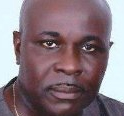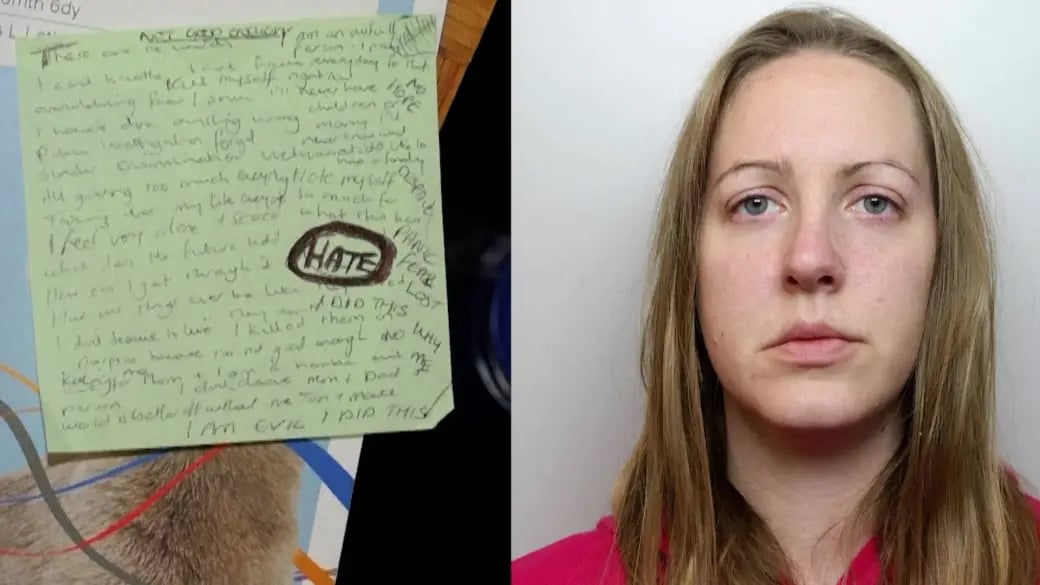One of the chilling stories from the United Kingdom last week was of the conviction, by a jury, of a 33-year old nurse, Lucy Letby, of wilfully murdering seven babies entrusted under her care and attempting to kill seven others while working at the Countess of Chester hospital between June 2015 and June 2016. Two of Lucy Letby’s victims were twin brothers, who were born prematurely. They were just days old when Letby tried to kill them in April 2016.
It was said that Letby tried to pass off the harm she wilfully did to babies under her care as no more than the worsening of each baby’s existing vulnerability. The truth however was that in her hands innocuous substances like air, milk, fluids and medications like insulin were weaponized. She was arrested twice by the police in connection with their investigation in 2018 and 2019 – before being finally arrested in November 2020. She was in her mid-20s when she committed those heinous crimes. One of the hand-written notes authorities found during searches of her home read: “I don’t deserve to live. I killed them on purpose because I’m not good enough to care for them.” In another memo she also reportedly wrote, “I am a horrible evil person” and in capital letters “I AM EVIL I DID THIS.”
But Lucy Letby was not an isolated case of those entrusted to help preserve life turning into life takers. Before her were other cases – both in the UK and elsewhere. One of the most celebrated in recent times in the United Kingdom was that of Harold (aka Fred) Shipman. It was said that as a teenager, Harold saw the agony her mother went through while suffering from lung cancer and was quite impressed by the relief offered by morphine. He reportedly became obsessed with opiates from that time such that by 1974 – just one year into his medical practice – he was caught forging prescriptions of Demerol for himself. He paid a small fine for that and served a short period in rehab for drug addiction. He returned to medical practice afterwards as a respected member of his community. But in 1998, the coroner was alerted to the high death rate among Shipman’s patients but there was insufficient evidence to charge him with anything. One Kathleen Grundy however turned out to be his Waterloo. Suspicions were aroused when it was found that Grundy’s will excluded her family members but left a whopping £386,000 to Dr. Shipman. An investigation was launched which led to Grundy’s body being exhumed and autopsied. Not only was heroin found in her, it was also discovered that her medical records had been faked and that her supposed will was written on Dr. Shipman’s typewriter. There were more exhumations of people who had died under Dr. Shipman’s care and further investigations revealed a pattern: he would administer lethal doses of heroin, sign death certificates and falsify medical records to show an alternative cause of death.
In 2000, Shipman was given 15 life sentences for the murder of 15 women by lethal heroin injections between 1995 and 1998. It was estimated that over the course of his practice, Shipman killed more than 218 patients in this manner, making him Britain’s most prolific serial killer to date. In 2004, he hanged himself in his prison cell, aged 57. Even after his conviction, Dr. Shipman and his wife, Primrose, continued to maintain his innocence and disputed the scientific evidence against him.
Advertisement
But medical personnel turning into undertakers is not only a British phenomenon. In Italy, there was also the celebrated case of the emergency room doctor Leonardo Cazzaniga, 65, and his nurse lover, Laura Taroni. Prosecutors accused the doctor of killing in a “delirium of omnipotence” by administering overdoses of anaesthetic and sedative drugs to his patients”. Police investigated 40 deaths between 2011 and 2014 that aligned with Cazzaniga’s work shift. Remarkably one of the patients was Dr Cazzaniga’s own father. While Dr. Cazzaniga’s defence lawyers argued during his trial that his practices were consistent with standard palliative care, the prosecution noted that one of the victims had died after being admitted with nothing more than a dislocated shoulder.
Dr Cazzaniga was convicted of killing his nurse-lover’s father-in-law and acting in conjunction with her to kill her husband. Taroni was said to have convinced her husband that he had diabetes and deliberately administered lethal doses of insulin to him. In a police wiretap, Taroni was quoted as saying: “From time to time, I want to kill someone. I need it.” While Dr. Cazzaniga was convicted of killing ten people and sentenced to life imprisonment, Taroni was sentenced to 30 years in jail for murdering two members of her family.
One of the famous cases of medical personnel turning into life takers in the USA was that of the neurosurgeon Christopher Duntsch. Born on 3 April 1971, Duntsch completed his undergraduate medical degree in 1995 and also successfully completed an MD-PhD programme in 2010. He did his neurosurgery residency programme at the University of Tennessee Health Science Centre where he was said to have completed his residency with fewer than 100 surgeries (a tenth of what’s typical) and also reportedly spent a portion of his training in a programme for impaired physicians, largely due to his fondness for cocaine.
Advertisement
Shortly after being hired by Baylor Regional Medical Centre at Plano in Texas, his very first surgery patient was left partially paralyzed, and subsequent patients were equally disabled or maimed by his incompetence and carelessness. In all, Duntsch, who was nicknamed Dr. Death or Dr .D. was accused of injuring 33 of 38 surgery patients over two years. Dr, Duntsch left a trail of injured patients still at more hospitals. He was arrested in 2015 on criminal charges and was in 2017 found guilty and sentenced to life imprisonment.
In systems where the institutions are strong and investigative authorities are methodical without fear of being accused of ethnic or religious witch-hunts if they raised red flags against anyone, many of the bad eggs in the medical and other professions eventually get caught and weeded out. If we have not heard of medical personnel who are serial killers in Nigeria, it is not because they do not exist. Most likely they do but the system that should sniff them out seems rather weak. This is especially so in the rural areas where pharmacies (or chemists) and community health practitioners do not feel accountable to anyone even in faces of obvious neglect. This should be a challenge to the new Minister of Health and the various commissioners of health at the state levels.
That serial killers are also among medical doctors and nurses – who are usually among the most respected members of the society in virtually every clime – brings to mind the words of Johanna (‘Hanna’) Arendt, the German-American political theorist. In his classic work, Eichmann in Jerusalem: A Report on the Banality of Evil (1963) Arendt tells us that the great evils in history were not executed by fanatics or sociopaths but rather by ordinary, even decent people, who accepted the premises of their ignoble actions and therefore participated in them on the grounds that those heinous actions were normal. This is the so-called doctrine of ‘normalising the unthinkable’ or routinization of evil. It explains why in tragedies like the Jewish holocaust or the Rwandan genocide, we had respectable people – medical doctors, academics and even the clergy who were implicated as participants or connivers in the gory acts. While betrayal of trusts happens all the time – body guards sometimes kill people they are paid to protect as happened with the killing of Indira Ghandi on 31 October 1984, leaders of presidential guards also sometimes conspire to topple the leaders they were paid to protect (as happened recently in Niger Republic and in the coup that toppled Gowon in 1975) and African politicians often turn against the people that elected them, there is something especially heart-wrenching when doctors and nurses turn against their patients.
Adibe is Professor of Political Science and International Relations at Nasarawa State University, Keffi and Extraordinary Professor of Government Studies at North Western University, Mafikeng South Africa. He is also the founder of Adonis & Abbey Publishers and can be reached at 0705 807 8841(Text or WhatsApp only).
Advertisement
Views expressed by contributors are strictly personal and not of TheCable.







